First Quarterly ORSP Forum Shows OR Approaches in Responding to the Pandemic
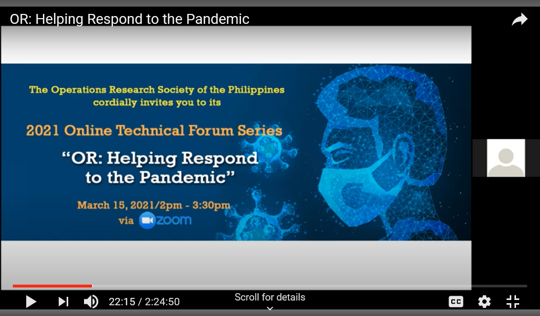
ORSP launched its first quarterly online technical forum for 2021 with its first in the series on the theme OR: Helping Respond to the Pandemic.
The two-hour forum was opened by ORSP Executive Director Elise del Rosario who introduced ORSP President Marie Shella Mariscal, Operations Research Manager of the San Miguel Corporation. Her welcome remarks highlighted how the Covid 19 has impacted all aspects of life and the economy and the relevance of OR in all these experiences, as will be shown in the two talks for the day.
ORSP Board member Dennis Cruz introduced Dr. Charlle Sy who is an associate professor and research fellow in the Department of Industrial Engineering of De La Salle University. She in turn, introduced co-presenter Dr. Dr John Frederick Tapia who is an associate professor in the Department of Chemical Engineering of De La Salle University.
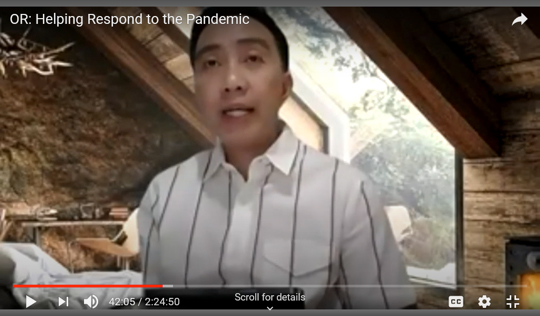 Their paper on An Optimization Approach to the Allocation of Covid-19 Vaccines tries to address how to allocate a limited amount of vaccines specially in the initial roll out that will minimize reinfection rates. She discussed how initially, an LP model to do this was developed that minimizes the sum of fatality rates among the various age groups. The output, however, showed that reinfection rates did not improve appreciably with this approach. They developed a second model that minimizes reinfection rates with the use of eigenvalues. This resulted in a nonlinear programming model which minimizes the reproduction rate of the virus. The reproduction rate represents the expected number of secondary infections generated by an infectious individual. As designed, the model could handle multiple vaccines with different levels of efficacy. A hypothetical case study illustrates the computational capability of the model. Furthermore, the group of Dr. Tapia has developed a Python-based software to aid in model deployment.
Their paper on An Optimization Approach to the Allocation of Covid-19 Vaccines tries to address how to allocate a limited amount of vaccines specially in the initial roll out that will minimize reinfection rates. She discussed how initially, an LP model to do this was developed that minimizes the sum of fatality rates among the various age groups. The output, however, showed that reinfection rates did not improve appreciably with this approach. They developed a second model that minimizes reinfection rates with the use of eigenvalues. This resulted in a nonlinear programming model which minimizes the reproduction rate of the virus. The reproduction rate represents the expected number of secondary infections generated by an infectious individual. As designed, the model could handle multiple vaccines with different levels of efficacy. A hypothetical case study illustrates the computational capability of the model. Furthermore, the group of Dr. Tapia has developed a Python-based software to aid in model deployment.
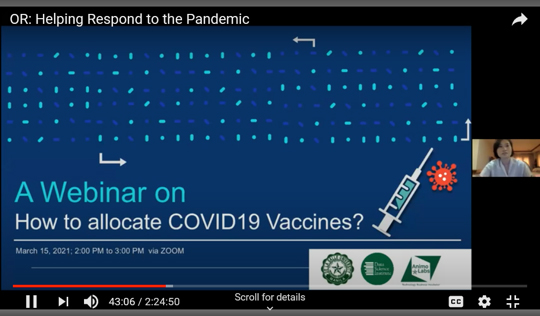 The series of questions posed by the audience moderated by D. Cruz showed the high level of audience interest in the research and suggestions on possible improvements with the use of actual data were mentioned.
The series of questions posed by the audience moderated by D. Cruz showed the high level of audience interest in the research and suggestions on possible improvements with the use of actual data were mentioned.
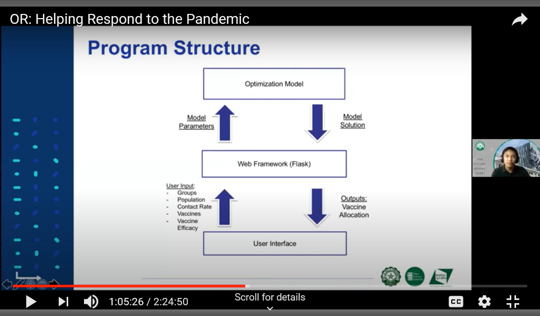 The second speaker was introduced by ORSP Board member Nestley Sore – Vic Reventar is himself an ORSP Board member and a Lecturer at the Department of Quantitative Methods and Information Technology Department at the John Gokongwei School of Management at the Ateneo de Manila University who has done extensive consulting work in various areas of Operations Research, one of which concerns his talk, the COVID 19 and its Effects on Supply Chains in the Philippines.
The second speaker was introduced by ORSP Board member Nestley Sore – Vic Reventar is himself an ORSP Board member and a Lecturer at the Department of Quantitative Methods and Information Technology Department at the John Gokongwei School of Management at the Ateneo de Manila University who has done extensive consulting work in various areas of Operations Research, one of which concerns his talk, the COVID 19 and its Effects on Supply Chains in the Philippines.
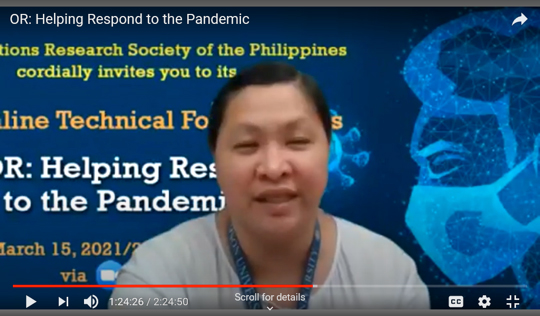 The immediate Philippine government measure to mitigate the pandemic, Enhanced Community Quarantine (ECQ), limited the mobility of people and minimized “contact-rate” through social distancing. These resulted not only in income reduction for most employees but also unintended effects on the manufacturing and agricultural sectors and their distribution systems. These consequences were fully visualized in the system dynamics and agent-based modeling simulation models of the Covid 19 and supply chain presented by the speaker.
The immediate Philippine government measure to mitigate the pandemic, Enhanced Community Quarantine (ECQ), limited the mobility of people and minimized “contact-rate” through social distancing. These resulted not only in income reduction for most employees but also unintended effects on the manufacturing and agricultural sectors and their distribution systems. These consequences were fully visualized in the system dynamics and agent-based modeling simulation models of the Covid 19 and supply chain presented by the speaker.
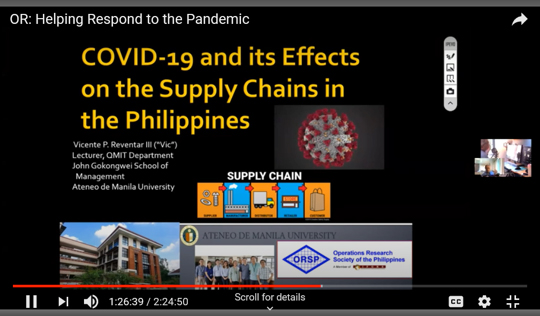
V. Reventar pointed out that the model clearly illustrates that systems are interlinked and that policy decisions affect a major segment of society. This kind of analysis will be useful in evaluating the most effective way of addressing disruptions in the local supply chains which include such measures as increasing production and inventory capacities, repositioning inventories in certain regions or facilities under quarantine, and others. He pointed out that any disruption affecting any segment in the supply chain affects the integrity of the whole chain and the time-to-recover from such a disruption.
He ended by recommending that the government policy effort in managing the effects of COVID-19 must consider the flow of goods and services with the use of the simulation models presented. Again, the questions at the end acknowledged the power that this modeling could potentially offer to the current situation.
It could be said that the136 participants from UST, UP Los Baños, Holy Angel University, De La Salle Lipa, Quezon City Polytechnic University, Batangas State University – Alangilan, Asia Pacific College, Adamson University, San Miguel Corporation, Phil Batteries Inc., and CSIRO (Australia) left the zoom meeting with an added perspective of how OR tools could aid national policy.
